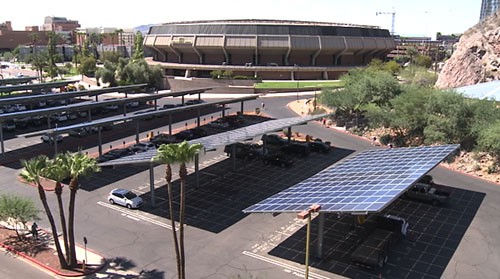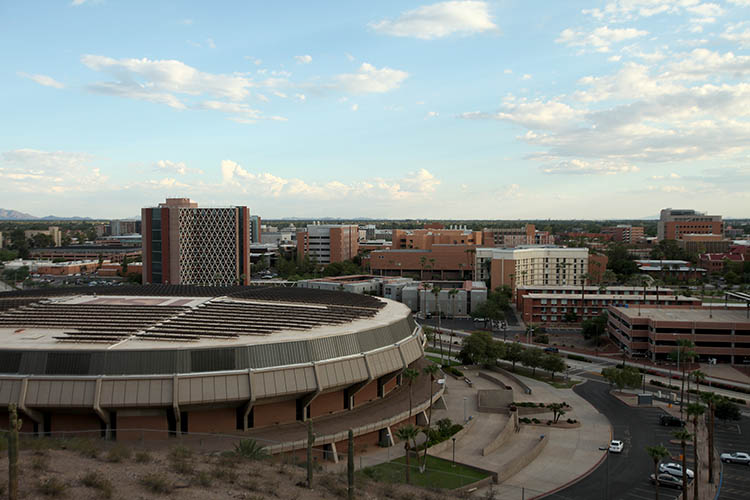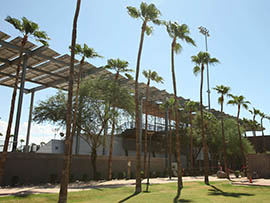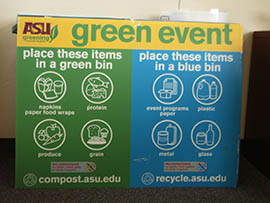Cronkite News has moved to a new home at cronkitenews.azpbs.org. Use this site to search archives from 2011 to May 2015. You can search the new site for current stories.
ASU, UA athletic units win national recognition for sustainability efforts
TEMPE – At Arizona State University baseball games, workers urge fans to toss uneaten hot dogs in composting bins rather than trash cans.
Solar panels on the roof of Wells Fargo Arena, site of ASU basketball and volleyball games as well as other sporting events, help power the lights and scoreboard.
University of Arizona football games are played on synthetic grass that’s made from recycled materials and doesn’t require watering.
A recent report by the Natural Resources Defense Council and the Green Sports Alliance highlighted sustainability efforts by the ASU and UA athletic departments among 10 universities nationwide. It noted that the visibility of college sports makes a “powerfully visible” commitment to sustainability.
Nick Brown, ASU’s director of university sustainability practices, made sports a priority upon assuming the role in 2011.
“ASU is a leader in this regard,” he said. “Not a whole lot of teams are doing this.”
Brown noted that ASU has nine solar installations on and near athletic facilities, most of them feeding directly into venues.
“Sun Devil Athletics has gone hand-in-hand, arm-in-arm with the rest of ASU into the solar age,” he said.
Solar panels provide shade at Farrington Stadium, home of ASU’s softball team, as well as generating enough electricity for the university to declare the facility climate-neutral. Athletic department offices at Sun Devil Stadium get solar power from panels atop the Ed and Nadine Carson Student-Athlete Center.
ASU’s contract with Sodexo, which operates concessions at athletic facilities, requires that food be compostable and that cups and wrappers be recyclable. With that in mind, venues switched hot dog wrappers this year to plastic that can be recycled.
Maggie Emmons, assistant director of media relations and communications for Sun Devil Athletics, said the sustainable practices align with ASU’s larger vision.
“We’re also what Athletic Director Steve Patterson likes to refer to as the front door of the university,” she said.
Through the large numbers of fans drawn to athletic facilities, ASU has a platform to spread its sustainability message, Emmons said.
“Whether it’s recycling, composting or just learning about how you impact the environment, I feel like athletics has the opportunity and the privilege to do that in a broad spectrum,” she said.
Jesse Minor, interim manager of the University of Arizona’s Office of Sustainability, said efforts there have included a detailed environmental-impact study of 2012 homecoming events. That life-cycle assessment created a baseline for UA to evaluate the environmental footprint of future homecoming celebrations and provided an opportunity to promote sustainability, he said.
Dubbed the Deep Green Homecoming, the effort focused on energy consumption and waste inside the stadium and the impact of regional and national travel. Workers encouraged tailgaters to recycle.
“I think the reality of a place like the UofA is that so many of our alumni and so many of our community partners interact with the university on the basis of sports,” Minor said. “So there is a chance to influence behavior and do a little bit of environmental or sustainable education.”
This season at Arizona Stadium, the football team is playing on CoolPlay, turf that is made of recycled materials and designed to lower the on-field temperature 15-20 degrees. Because it requires no watering, which isn’t the case with all synthetic playing surfaces, CoolPlay saves 1 million gallons of water every year, Minor said.
Emmons, with ASU, said schools can tap into the camaraderie among sports fans to promote sustainability.
“One of the great things about athletics is it’s unifying,” she said. “You have people of different political leanings, different race, religion – anything that’s divisive. People forget that when they come out for a football game.”











